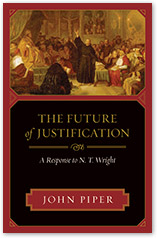I have shifted the Justification discussion and other theologically nuanced discussions to another blog, theological.wordpress.com where I explain why I have created a separate blog and what I perceive the primary exegetical issues to be with 2 Cor 5:21.
Tag: John Piper
The Future of Justification?
*I have shifted this discussion to theological.wordpress.com
The much anticipated Piper book The Future of Justification is a well-thought out response to N.T. Wright’s overall theology of justification. His tone is humble yet forceful, irenic and ever pastoral. Piper levels various critiques of Wright’s understanding of justification, some valid others invalid. However, his treatment of the classic text on double imputation, 2 Cor 5:21, is disappointing.
In particular, Piper (and most Reformed theologians) take issue with Wright’s interpretation of the phrase “righteousness of God.” Piper takes this to be legal language inferring the imputation of Christ’s righteousness to our account. Wright takes it to mean God’s covenantal faithfulness embodied in those who hope in Christ.
Piper sets up the reader up for his treatment of 2 Cor 5:21 very early in the book: “When Paul says, For our sake he made him to be sin who knew no sin, so that in him we might become the righteousness of God,” one must break the back of exegesis to make this mean, “We become the covenant faithfulness of God.” Chapter 11 is my effort to show that this unprecedented reinterpretation of 2 Corinthians 5:21 does not stand.” (24) However, chapter 11 is hardly a rigorous treatment of the text, with only 5 pages actually devoted to this verse. Two of his three contentions against Wright are hardly central to the actual text itself. Instead, they focus on the context, arguing that it is more soteriological than covenanatal (which are hardly incompatible).
What is most disappointing about his exegesis of the text is his failure to explain why Paul uses two very different words to describe a) Christ “becoming” sin and b) our “being made” the righteousness of God. He simply assumes that the iva clause (so that) means tit for tat, Jesus gets sin the same way we get righteous. The problem with this is that Paul actually uses two very different verbs to communicate the activity upon Jesus and humanity.
In 2 Cor 5:21 when God is making (poiew) Jesus sin, it is different from how God then makes (ginomai) us the righteousness of God. When God makes the one who was not acquainted with sin (personally) to become sin, he in cooperation with Jesus made sure that Christ knew sin by experiencing its damning, deathly result–separation from him (not having sin in his back account). We, in turn, actually become the righteousness of God. Whatever interpretation one takes for that phrase, the case still remains that the verb used refers to us constitutively not fictionally becoming the righteousness of God. Those in Piper’s camp, however, would have us interpret us as receiving imputed righteousness in our salvation bank accounts. Where we had an infinite deficit of sin, we now have an infinite surplus of righteousness.
This verbal issue is not discussed in chapter 11 or anywhere else that I can find in the book. Other issues could be mentioned, but I believe, this is perhaps the most glaring oversight. I am open to being persuaded of the Reformed position, but at this point, have not found it compelling in 2 Cor 5:21.
How To Know God?
I had the pleasure of preaching at Vista Community Church this past Sunday. The audio is up and on podcast.

